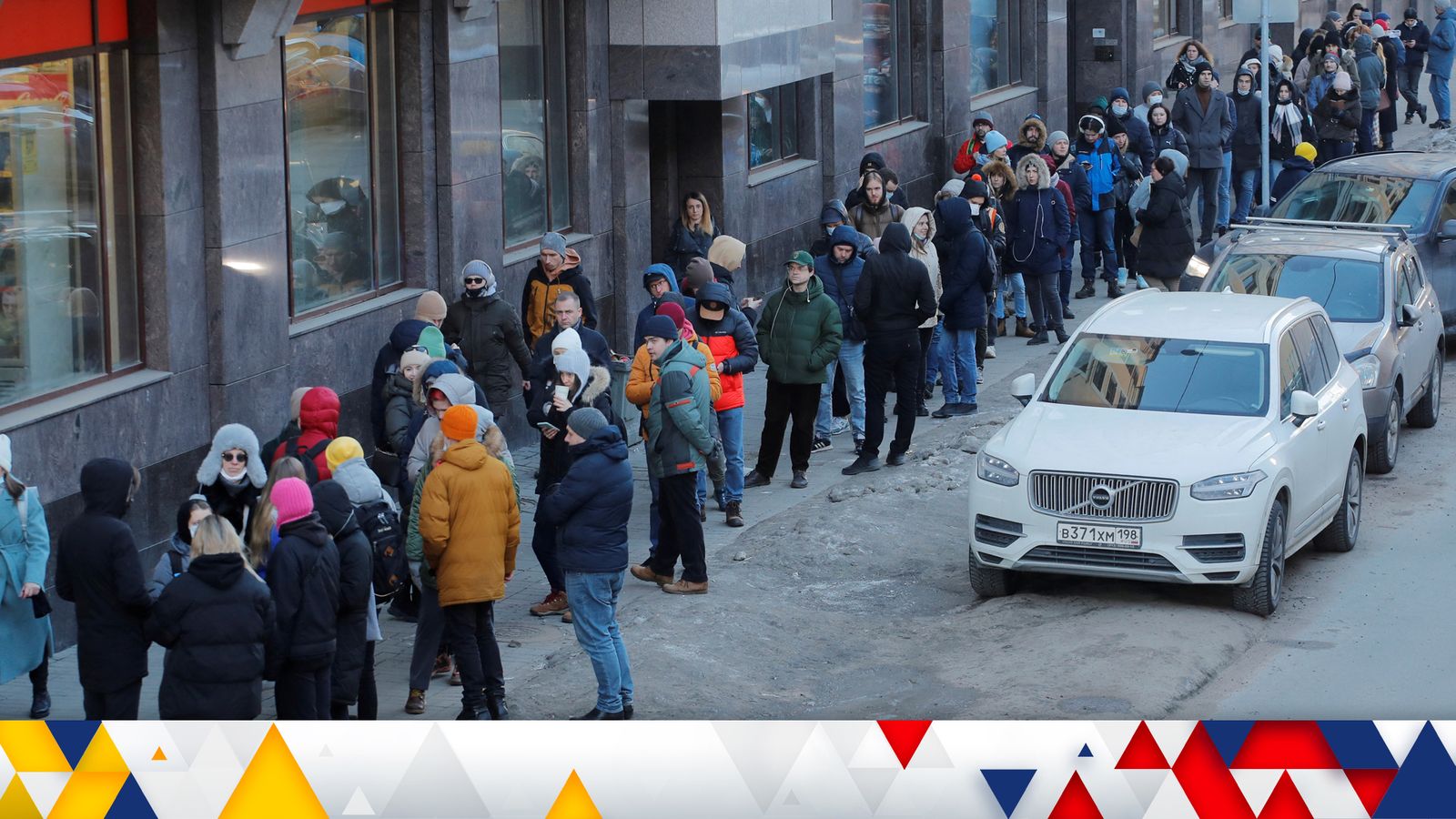There is no question that Western sanctions imposed on Russia following its invasion of Ukraine are biting.
Ordinary Russians have been dismayed to find themselves deprived of Western goods to which they have become accustomed since the collapse of the old Soviet Union.
Businesses, meanwhile, have suffered from supply chain issues as parts they used to import have become scarce or, because they can no longer be paid for in hard currencies like the US dollar, unavailable entirely.
Russia ‘asks China for military assistance’ – Ukraine live updates
A good example is the Russian carmaker Lada, which has been forced to suspend production at its three factories at Moscow, Izkevsk and Togliatti. The latter, on the banks of the Rover Volga, employs a stunning 32,500 people.
Among the possible consequences of the sanctions regime that many in financial markets are watching for closely is the prospect of Russia defaulting on its debts.
The ratings agencies have already indicated they think this is a strong possibility.
COVID-19 travel rules: Remaining restrictions for entry to UK, including passenger locator forms, will end this week
Ukraine war: Majority of Britons think Russia sanctions don’t go far enough, Sky News poll reveals
Suits out, sports bras in as Office for National Statistics shakes up basket used to calculate inflation
The big three, S&P, Moody’s and Fitch, have all slashed Russia’s credit rating deep into “junk” territory with Moody’s now applying a higher likelihood to the prospect of Russia defaulting on its debt than that of countries such as Iraq and Ethiopia doing so.
Fitch said last week a Russian default was “imminent” while Kristalina Georgieva, the managing director of the International Monetary Fund, told US television at the weekend that a Russian default could no longer be regarded as “an improbably event”. She now expects Russia to suffer a “deep recession”.
Matters could reach a tipping point on Wednesday this week when Russia faces payments of $117m in coupons on two of its government bonds, both denominated in US dollars.
It has a grace period of 30 days in which to make the payment – taking it until 15 April to do so. A further payment of $359m is due on 31 March and a further $2bn becomes payable on 4 April.
Ordinarily, Russia would have no problem meeting interest payments on its debts, having built up foreign currency reserves of $643bn in the build-up to the invasion of Ukraine.
But the West’s stunning move to impose sanctions on Russia’s central bank days after the invasion has effectively cut the country out of the international financial system and prevents it from getting its hands on much of the money.
Even Russia’s own finance minister, Anton Siluanov, has admitted around $300bn worth of those reserves cannot currently be reached by the country. He argues that the West is trying to force Russia into what he calls an “artificial default” and has approved a temporary procedure to allow banks to make payments in foreign currency, but this is obviously going to be dependent on the sanctions regime and whether Western banks can accept the payments.
The exclusion of a number of Russian lenders from SWIFT, the worldwide interbank messaging system that helps facilitate cross-border payments, could hamper that.
Mr Siluanov has said that, if such payments were not possible, Russia stood prepared to pay its creditors in roubles.
And that is central to the issue now exercising investors and their lawyers – would this constitute a default by Russia?
All bonds issued by the Russian government since 2018 do contain provisions that allow repayments to be made in roubles but these do not apply to the two dollar-denominated bonds on which coupon payments are due on Wednesday.
Please use Chrome browser for a more accessible video player
Mr Siluanov indicated on Monday that Russia could seek, instead of roubles, to make the payments in China’s currency.
An estimated 13.1% of the Russian central bank’s foreign currency reserves, as at June last year, were held in the Chinese currency as Moscow sought to move away from US dollars and euros.
He told the TV channel Rossiya-24: “The Chinese yuan – a portion of gold and currency reserves is kept in this currency.
“When developing trade relations with China, we will use a share of gold and currency reserves denominated in the Chinese yuan. The yuan remains at present one of such sources of currency reserves of our country and we will use it in all aspects.”
Please use Chrome browser for a more accessible video player
The debate about whether Russia has actually defaulted is critical because of the potential knock-on effects across the global financial system.
Older market participants have sore memories of the last time Russia defaulted on its debt, in 1998, which sparked stock market declines around the world and prompted the collapse of LTCM, a large US hedge fund, which ended up having to be bailed out to avoid wider financial contagion.
That episode has also brought back some bad memories in Russia itself. It was the third largest debt default at the time and was regarded as a humiliation in Russia which, at the time, was headed by Boris Yeltsin.
It was only the second time Russia had defaulted on its debts, the first time being in 1918, when the Bolsheviks defaulted on debts run up by the government of Tsar Nicholas II after the Russian Revolution.
The chance of contagion still exists today.
One flashpoint could be the estimated $6bn worth of insurance policies – known as credit default swaps (CDS) – that have been sold to investors who own Russian debt that would compensate them in the event of a default.
The Financial Times has reported that Pimco, the bond investment business owned by the German insurance giant Allianz, owns $1.1bn of Russian CDS alone.
Whether or not those policies pay out will be down to the EMEA Credit Derivatives Determinations Committee, part of the International Swaps and Derivatives Association, an industry body that seeks to make the global derivatives markets operate safely and efficiently. Ironically, Pimco is one of the members of that committee.
But opinions differ as to whether a Russian default will spark as much financial fall-out as it did in 1998. Some argue that, following sanctions, the global financial system is effectively isolated from Russia to a large degree.
One thing is clear – the world probably does not have long to wait to find out.






















